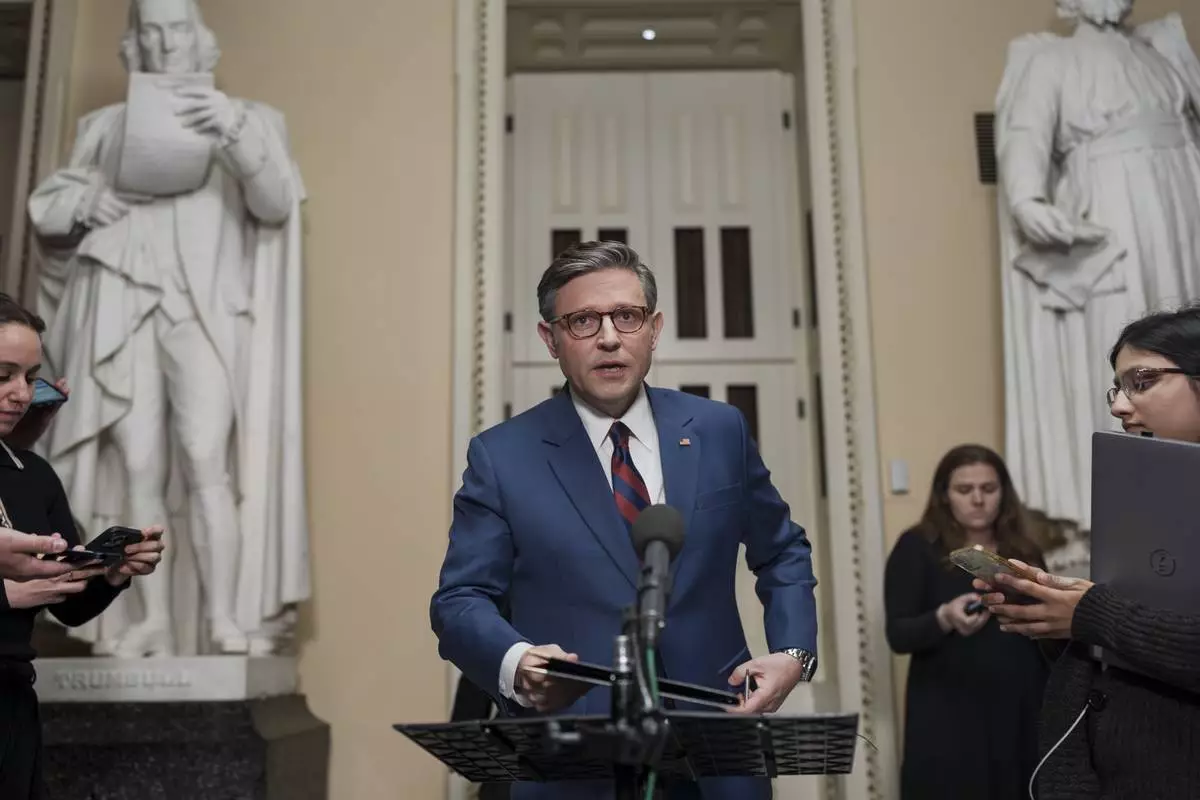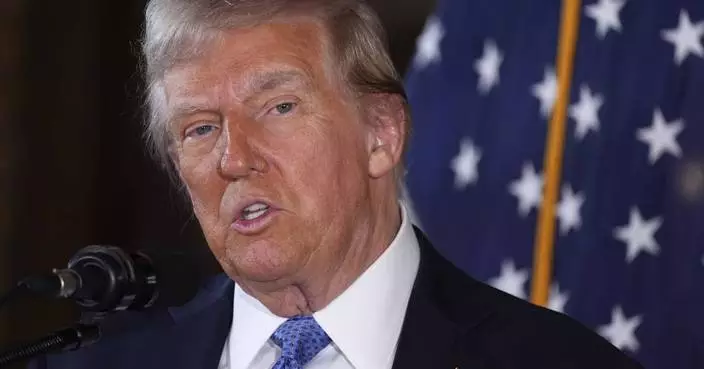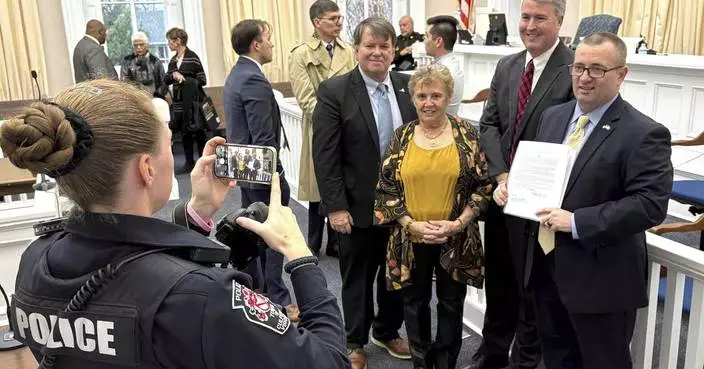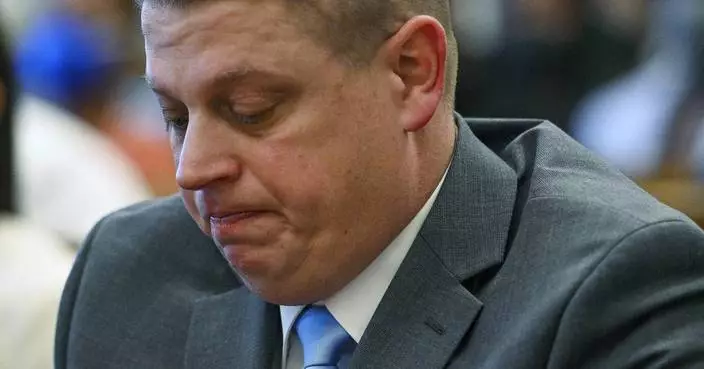WASHINGTON (AP) — A U.S. Army veteran was sentenced on Friday to probation instead of prison for his milestone conviction — and his leadership role — in a violent plot by members of the far-right Oath Keepers extremist group to keep Donald Trump in the White House after he lost the 2020 presidential election.
Joshua James was the first person charged in the U.S. Capitol riot to plead guilty to seditious conspiracy — the most serious crime arising from the Jan. 6, 2021, attack by a mob of Trump supporters.
James cooperated with the Justice Department's investigation but didn't testify at any of the trials for other Oath Keepers members, including the anti-government group's founder and top leader, Stewart Rhodes. James was the ninth and final Oath Keepers defendant to be sentenced after cooperating with prosecutors.
James, 37, of Arab, Alabama, expressed remorse before U.S. District Judge Amit Mehta sentenced him to three years of probation, including six months in a “residential re-entry center” and six months of home detention. James said he knows that his actions put police officers in danger on Jan. 6.
“That's not who I am,” he said. “I help people in danger.”
In sparing James from a prison sentence, Mehta said he wanted to ensure that the married father of three children could continue trying to “put his life together.”
“Because if he can do that, I think the rest of us can, too,” the judge added.
President-elect Donald Trump repeatedly has vowed to pardon Capitol rioters. At a sentencing on Wednesday for another cooperating Oath Keeper defendant, Mehta said it would be “frightening” if Rhodes is pardoned.
On Friday, the judge reflected on how other judges presiding over Jan. 6 cases have strived “to be fair and to do justice.”
“We haven't been doing politics here. Not at all,” he said.
The judge described James as a “true American hero” for his military service and praised him for having the courage to admit his guilt and cooperate with the government.
“It was about making amends for your actions and deciding to put your country back where it belonged,” Mehta said.
Assistant U.S. Attorney Troy Edwards said James' sentencing can help ensure that the Jan. 6 attack is “cemented in our long-term national memory."
“That is part of what we're doing here today,” the prosecutor added.
James was the first criminal defendant in over 60 years to enter a pretrial agreement with prosecutors to plead guilty to seditious conspiracy, according to his attorneys. The defense lawyers said James provided “pivotal” information about the Oath Keepers in his debriefs with investigators and his grand jury testimony.
A jury convicted Rhodes of seditious conspiracy for a plot to use force to stop the peaceful transfer of power from Trump to President Joe Biden after the 2020 election. In May 2023, Mehta sentenced Rhodes to 18 years in prison.
Prosecutors recommended two years of prison for James, arguing that he deserves credit for his cooperation. They said James helped authorities understand Rhodes' state of mind around Jan. 6 and how he could inspire his followers to join the plot.
The other cooperating Oath Keepers defendants also avoided prison sentences.
“James stands apart from these other cooperating defendants in part because of his leadership role in the conspiracy and significant impact he had on other individuals who acted at his instruction,” prosecutors wrote.
James was a regional leader for the Oath Keepers in Alabama and was in direct contact with Rhodes before the Jan. 6 riot. James and other Oath Keepers stored firearms in hotels on the outskirts of Washington, D.C., for a “quick reaction force" to possibly use, but they never deployed the guns.
As they approached the Capitol on Jan. 6, James and other Oath Keepers marched in a military-style "stack" formation. James helped lead other group members into the building through the East Rotunda doors, prosecutors said.
Inside the Capitol, James approached a police officer, grabbed his vest and pulled him toward the mob as he yelled, “Get out of my Capitol!" according to prosecutors.
After police pushed James out of the building, he reunited with Rhodes and other Oath Keepers. Two days later, James met Rhodes at a restaurant in Alabama.
“Rhodes expressed gratitude for James’s actions and told James to alter his physical appearance to conceal his identity,” prosecutors wrote.
James was 18 when he enlisted in the Army. He was 19 in 2007 when he was wounded in a car bombing that took down part of a highway bridge in Iraq.
“Over the next two years, his body slowly healed, but his career in the Army came to a disappointingly abrupt end," his attorneys wrote. "His sense of purpose and self-worth were replaced by feelings of guilt for not finishing his deployment and regret over a military career cut short.”
James, a welder, lost his military benefits after his conviction, costing him thousands of dollars per month in disability retirement payments.

FILE - The affidavit in support of the criminal complaint against Joshua James is photographed, March 2, 2022. (AP Photo/Jon Elswick, File)
Veering toward a midnight Friday government shutdown, House Speaker Mike Johnson is proposing a new plan that would temporarily fund federal operations and disaster aid, but punts President-elect Donald Trump demands for a debt limit increase into the new year.
On Thursday, the House rejected Trump’s new plan to fund operations and suspend the debt ceiling, as Democrats and dozens of Republicans refused to accommodate his sudden demands.
Here's the latest:
Hours to go before a midnight government shutdown, the House approved a new plan late Friday from Speaker Mike Johnson that would temporarily fund federal operations and disaster aid, but drops President-elect Donald Trump’s demands for a debt limit increase into the new year.
Johnson insisted Congress would “meet our obligations” and not allow federal operations to shutter ahead of the Christmas holiday season. But the day’s outcome was uncertain after Trump doubled down on his insistence that a debt ceiling increase be included in any deal — if not, he said in an early morning post, let the closures “start now.”
The bill was approved 366-34 and now goes to the Senate for expected quick passage.
President-elect Donald Trump’s billionaire ally Elon Musk played a key role this week in killing a bipartisan funding proposal that would have prevented a government shutdown, railing against the plan in more than 100 X posts that included multiple false claims.
Not only did the owner of the social platform X, an unelected figure, use his outsize influence on the platform to help sway Congress, he did so without regard for the facts and gave a preview of the role he could play over the next four years.
“Trump has got himself a handful with Musk,” said John Mark Hansen, a professor of political science at the University of Chicago. “Trump’s done this kind of thing before, blowing up a bill at the last minute. This time, though, it looks like he was afraid of Musk upstaging him. Now there’s a new social media bully in town, pushing the champion social media bully around.”
▶ Read more about Musk, the spending bill and misinformation on X
House Speaker Mike Johnson has set a vote for Friday evening on a new plan that would temporarily fund federal operations and disaster aid, but punted President-elect Donald Trump demands for a debt limit increase into the new year.
The outcome is uncertain. Johnson declined to disclose the new idea under consideration, but lawmakers said it would fund the government at current levels through March and adds $100 billion in disaster aid and $10 billion in agricultural assistance to farmers.
The vote comes ahead of a potential government shutdown at midnight.
“Depending on if the House can execute, I think we could probably tee everything out for later today,” said Sen. John Thune, who’ll take over as Senate majority leader in January.
“I think at this point, my view is we should accept whatever the House can pass,” said Sen. John Cornyn of Texas.
“And given the time of year and proximity to Christmas, I don’t think people want to hang around here any longer than they have to. And we’re going to do this all over again in three months,” Cornyn continued.
“Right now it looks like we’ll probably get out by tomorrow,” said Sen. Thom Thillis of North Carolina. But he added that senators were mostly waiting for the House to order itself.
“The work’s in the House. We’re ready to go, we just need something to react to,” Tillis said.
In his last floor speech Friday as the Senate’s Republican leader, McConnell said he’ll use his remaining time in the Senate to restore “American leadership and American strength,” pushing back on a growing number in his party, including President-elect Donald Trump, who have embraced U.S. isolationism.
He also warned that Republicans could “pay a political price” if they don’t pass legislation keeping the government open by midnight Friday. The Kentucky Republican said he’s has reminded his colleagues “how harmful it is to shut the government down and how foolish it is to bet your own side won’t take the blame for it.”
“As a bargaining chip, you pay a political price,” McConnell said.
South Dakota Sen. John Thune, the current No. 2 Senate Republican, will take over for McConnell in January when he steps down and as Republicans take the majority. McConnell will stay in the Senate at least until his term expires in two years.
There’s been plenty of criticism leveled at House Speaker Mike Johnson this week as Congress struggles to avert a government shutdown, and at least one Republican lawmaker says he won’t vote for Johnson to remain as speaker next year.
Rep. Thomas Massie, a longtime critic of Johnson, told reporters his determination to oppose Johnson has only been cemented by the speaker’s latest decision to depend on Democrats to pass a government funding bill. Republicans will have a thin majority next year, meaning Johnson can only lose a few votes in the speaker election on Jan. 3.
“I’m not going to vote for him for speaker,” said Massie. “This whole exercise demonstrates that he has a hard time making decisions, he comes up with ideas that don’t work and then we just kind of wander around trying to find a path forward until he figures out what” House Minority Leader Hakeem Jeffries will accept.
It’s also not clear whether — and how strongly — President-elect Donald Trump will back Johnson. The incoming president has so far been supportive of the speaker, but said this week he needed to show he could drive a tough deal. Johnson ultimately failed to include Trump’s demand to lift the nation’s debt ceiling in the legislation.
House Speaker Mike Johnson says Republicans had reached a consensus on a deal to fund the government but provided no details on its contours.
“We have a unified Republican Conference. There is a unanimous agreement in the room that we need to move forward,” Johnson told reporters as he exited a House GOP conference meeting.
“I will not telegraph to you the specific details of that yet, because I’ve got a couple of things I got to wrap up in a few moments upstairs, but I expect that we will be proceeding forward,” he said.
“We will not have a government shutdown,” Johnson declared.
The speaker added that lawmakers “will meet our obligations for our farmers who aid for the disaster victims all over the country, and for making sure that military and essential services and everyone who relies upon the federal government for a paycheck is paid over the holidays. I’ll give you the more details here in just a few moments.”
House Majority Leader Steve Scalise, R-La., told reporters Republicans are still debating the contours of a new budget deal but “ultimately we will bring something to the floor, either through a suspension or a rule, and we’re making that decision.”
Scalise noted that they were examining the role of the debt ceiling in a potential deal but didn’t elaborate further.
When asked whether Trump was briefed on the plan, Scalise replied: “The president’s very interested in how his administration will start in January. So we want to be on a footing for success, so that we can move that agenda through. We have a very bold agenda that starts in January.”
House Republicans are huddled in the Capitol basement as leadership tries to find a path forward that would prevent an extended government shutdown.
So far, Republicans who were in the meeting have said they’re only discussing options on how to advance a stopgap government funding bill, as well as disaster aid and financial help for farmers.
“They haven’t made any decisions about what they’re going to bring forward yet,” said Rep. Matt Rosendale, a Montana Republican.
Rep. Chip Roy, a Freedom Caucus member who voted down the recent Trump-backed budget bill, left the meeting in a rush as lawmakers haggled.
“I’m not going to say a word, I’ve got somewhere to be,” Roy told reporters as he exited the room.
White House press secretary Karine Jean-Pierre pushed back after getting numerous questions at her daily briefing Friday about why President Biden hasn’t spoken publicly about the possibility of a government shutdown.
“This is not for the president to fix,” she said. “Republicans need to fix the mess that they caused.”
President Joe Biden has discussed the potential shutdown with Senate Majority Leader Chuck Schumer and House Minority Leader Hakeem Jeffries, White House press secretary Karine Jean-Pierre said Friday.
“There’s still time,” Jean-Pierre said, to avoid a partial government shutdown.
She said Republicans created the situation and are responsible for fixing it.
“Republicans blew up this deal. They did, and they need to fix this,” Jean-Pierre said.
That could involve splitting up the previous efforts — government funding, disaster and agricultural aid into separate votes — with a debt ceiling vote potentially later.
They’re meeting privately during the lunch hour to discuss next steps, with a shutdown less than 12 hours away.
That’s according to multiple people who received an update in a closed door Democratic Caucus meeting.
But there was no discussion in the meeting on whether a deal is being discussed or the details of legislation.
Senate Majority Leader Chuck Schumer is calling on House Speaker Mike Johnson to return to a stopgap funding agreement he had negotiated with Democrats.
Schumer, a New York Democrat, called that agreement in a floor speech Friday morning “the quickest, simplest, and easiest way we can make sure the government stays open while delivering critical emergency aid to the American people.”
Johnson abandoned that legislation earlier this week after first Elon Musk, then President-elect Donald Trump opposed it. But the Republican speaker is facing few options to avert a government shutdown at the end of the day while also appeasing the demands of his fellow Republicans.
Democratic leaders so far have demanded that he stick to their deal in order to gain their support to pass it through Congress.
Friday morning, Trump continued his insistence that a debt ceiling increase be included in any deal — and if not, let the closures “begin now.”
He issued his latest demand as Speaker Johnson arrived early at the Capitol, instantly holing up with Vice President-elect JD Vance and some of the most conservative Republicans in the House Freedom Caucus who helped sink Trump’s bill in a spectacular Thursday evening flop.
“If there is going to be a shutdown of government, let it begin now,” Trump posted on social media.
Trump does not fear government shutdowns the way Johnson and the lawmakers see federal closures as political losers that harm the livelihoods of Americans. The incoming Trump administration vows to slash the federal budget and fire thousands of employees. Trump himself sparked the longest government shutdown in history in his first term at the White House.
House Minority Leader Hakeem Jeffries laid blame for the failure of a package to fund the federal government on Republican donors and the GOP’s economic agenda.
“Republicans would rather cut taxes for billionaire donors than fund research for children with cancer,” Jeffries, D-N.Y., wrote on the social media platform Bluesky.
The House Democrat’s leader further predicted a government shutdown “will crash the economy, hurt working class Americans and likely be the longest in history.”
“Welcome back to the MAGA swamp,” he concluded.
Before 9 a.m., a number of the speaker’s biggest critics brought their grievances to a private meeting as a shutdown deadline looms over Capitol Hill. Reps. Chip Roy, Andy Biggs, Bob Good and others, all who voted against the Trump-backed plan Thursday, met with Johnson as Republicans look for a way forward on a short-term spending deal that includes a suspension of the nation’s debt limit.
Good of Virginia came out and said he would surprised if there was a vote Friday on any path forward. Moments later, Rep. Lauren Boebert said Republicans were making progress and having Vice President-elect JD Vance in the room is helping move things toward a resolution that can get a majority on the floor.
“I think President Trump was possibly, sold a bad bill yesterday,” the Colorado lawmaker said. “I did not want to see a failure on the House floor for the first demand that President Trump is making.”
But, she added, the failure on the floor has forced many of her colleagues to come together Friday.
As the speaker twisted Thursday in Washington, his peril was on display at Turning Point USA’s conservative AmericaFest confab, where Trump ally and 2016 campaign architect Steven Bannon stirred thousands with a takedown of the Louisiana Republican.
“Clearly, Johnson is not up to the task. He’s gotta go. He’s gotta go,” Bannon said, drawing cheers and whistles.
Bannon, both a bellwether of and influencer on the mood among Trump’s core supporters, wasn’t done.
“He doesn’t have what we call the right stuff — that combination of guts and moxie and savvy and toughness,” he said, comparing Johnson, a reserved, polite lawyer, to the gleeful brutishness of the president-elect and his populist backers. “You can punch MAGA in the face and they’re going to get up off the canvas, and they’re going to punch you back three times harder.”
Bannon didn’t float a replacement for Johnson but emphasized that the job description for any speaker — and every other Republican in Washington — is simple: “We have nothing to discuss. It’s only about the execution of President Trump’s plan.”
And he called Thursday’s proposed deal “laughable.”
“It’s not a serious proposal,” Jeffries said as he walked to Democrats’ own closed-door caucus meeting. Inside, Democrats were chanting, “Hell, no!”
Coming and going outside Speaker Mike Johnson’s office Thursday night, House Republicans offered little clarity on a path forward for a budget deal after a Trump-endorsed proposal failed to pass.
Rep. Kat Cammack, a Republican who voted against the bill, told reporters that “this was not an easy vote for constitutional conservatives.” She added, “We’re going to work through the night and figure out a plan.”
“We are still working diligently. and we are still making progress,” Rep. Lisa McClain said, without offering further details.
“We tried several things today most of our members went for, but the Democrats decided that they want to try and shut it down, but we’re going to keep working,” Rep. Steve Scalise, the Republican majority leader, told reporters. Nearly three dozen Republicans joined Democrats in voting down the resolution.
Vice President Kamala Harris cancelled a planned trip to Los Angeles with Washington on the verge of a government shutdown.
She had been scheduled to travel to her home state late Thursday, but instead will remain in the capital, the White House said, after Republicans backed away from a bipartisan compromise to fund the government.
The House rejected President-elect Donald Trump’s new plan Thursday to fund operations and suspend the debt ceiling.
In a hastily convened evening vote punctuated by angry outbursts over the self-made crisis, the lawmakers failed to reach the two-thirds threshold needed for passage — but House Speaker Mike Johnson appeared determined to reassess, before Friday’s midnight deadline.
“We’re going to regroup and we will come up with another solution, so stay tuned,” Johnson said after the vote. The cobbled-together plan didn’t even get a majority, with the bill failing 174-235.
The outcome proved a massive setback for Trump and his billionaire ally, Elon Musk, who rampaged against Johnson’s bipartisan compromise, which Republicans and Democrats had reached earlier to prevent a Christmastime government shutdown.
▶ Read more about the vote and where things stand

FILE - Republican presidential nominee former President Donald Trump delivers remarks on the damage and federal response to Hurricane Helene, in Swannanoa, N.C., Oct. 21, 2024. (AP Photo/Evan Vucci, File)

Speaker of the House Mike Johnson, R-La., talks briefly to reporters just before a vote on an interim spending bill to prevent a government shutdown, at the Capitol in Washington, Thursday, Dec. 19, 2024. (AP Photo/J. Scott Applewhite)












